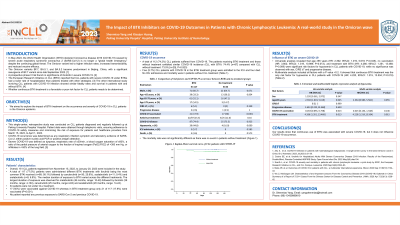Category: General Abstract
1151 - The Impact of BTK Inhibitors on COVID-19 Outcomes in Patients with Chronic Lymphocytic Leukemia: A real-world study in the Omicron wave

Objective: This study aims to examine the impact of Bruton tyrosine kinase inhibitors (BTKi) on the occurrence and severity of COVID-19 in patients with chronic lymphocytic leukemia (CLL) in the Omicron wave.
Methods: This was a single-center, retrospective study focusing on CLL patients. Data was collected through telephone interviews, and a standardized questionnaire was used to gather information on demographics, COVID-19 outcomes, treatment history, and BTKi usage. Statistical analysis, including chi-square tests and logistic regression, was performed to assess the association between BTKi usage and COVID-19 outcomes. Kaplan-Meier survival curves were used to analyze the impact of BTKi on patient survival.
Results: In this study, 151 CLL patients were included, with 66.2% being male and the median age being 67 years. 117 (77.5%) patients took BTK inhibitor alone as the treatment. Most patients received ibrutinib (n=68; 58.1%) followed by zanubrutinib (n=30; 25.6%), acalabrutinib (n=11; 9.4%), and orelabrutinib (n=8; 6.8%). 34 patients did not receive any treatment. Most patients did not have progressive disease. 17 (50%) were vaccinated against COVID-19 in patients not receiving anti-leukemia treatment whereas only 17 (18%) of those were under BTKi treatment vaccinated (P < 0.001). BTKi treatment was not associated with a higher risk of COVID-19 infection, but it was associated with a higher incidence of hypoxemia in patients with COVID-19. Among the CLL patients who received BTK inhibitors, 44.8% experienced hypoxemia. Univariate analysis identified age, lack of vaccination, and BTK inhibitor treatment as adverse risk factors for hypoxemia in CLL patients with COVID-19. Furthermore, multivariate analysis revealed that patients treated with BTK inhibitors had a four times higher incidence of exhibiting hypoxemia compared to CLL patients not receiving any treatment.
Conclusion: In conclusion, continuous BTKi was found to be a poor risk factor for severe COVID-19 outcomes in CLL patients.
Methods: This was a single-center, retrospective study focusing on CLL patients. Data was collected through telephone interviews, and a standardized questionnaire was used to gather information on demographics, COVID-19 outcomes, treatment history, and BTKi usage. Statistical analysis, including chi-square tests and logistic regression, was performed to assess the association between BTKi usage and COVID-19 outcomes. Kaplan-Meier survival curves were used to analyze the impact of BTKi on patient survival.
Results: In this study, 151 CLL patients were included, with 66.2% being male and the median age being 67 years. 117 (77.5%) patients took BTK inhibitor alone as the treatment. Most patients received ibrutinib (n=68; 58.1%) followed by zanubrutinib (n=30; 25.6%), acalabrutinib (n=11; 9.4%), and orelabrutinib (n=8; 6.8%). 34 patients did not receive any treatment. Most patients did not have progressive disease. 17 (50%) were vaccinated against COVID-19 in patients not receiving anti-leukemia treatment whereas only 17 (18%) of those were under BTKi treatment vaccinated (P < 0.001). BTKi treatment was not associated with a higher risk of COVID-19 infection, but it was associated with a higher incidence of hypoxemia in patients with COVID-19. Among the CLL patients who received BTK inhibitors, 44.8% experienced hypoxemia. Univariate analysis identified age, lack of vaccination, and BTK inhibitor treatment as adverse risk factors for hypoxemia in CLL patients with COVID-19. Furthermore, multivariate analysis revealed that patients treated with BTK inhibitors had a four times higher incidence of exhibiting hypoxemia compared to CLL patients not receiving any treatment.
Conclusion: In conclusion, continuous BTKi was found to be a poor risk factor for severe COVID-19 outcomes in CLL patients.
- SY
Shenmiao Yang, MD
Peking University Institute of Hematology, Peking University People’s Hospital
Beijing, China - XH
Xiaojun Huang, MD
Peking University Institute of Hematology, China

